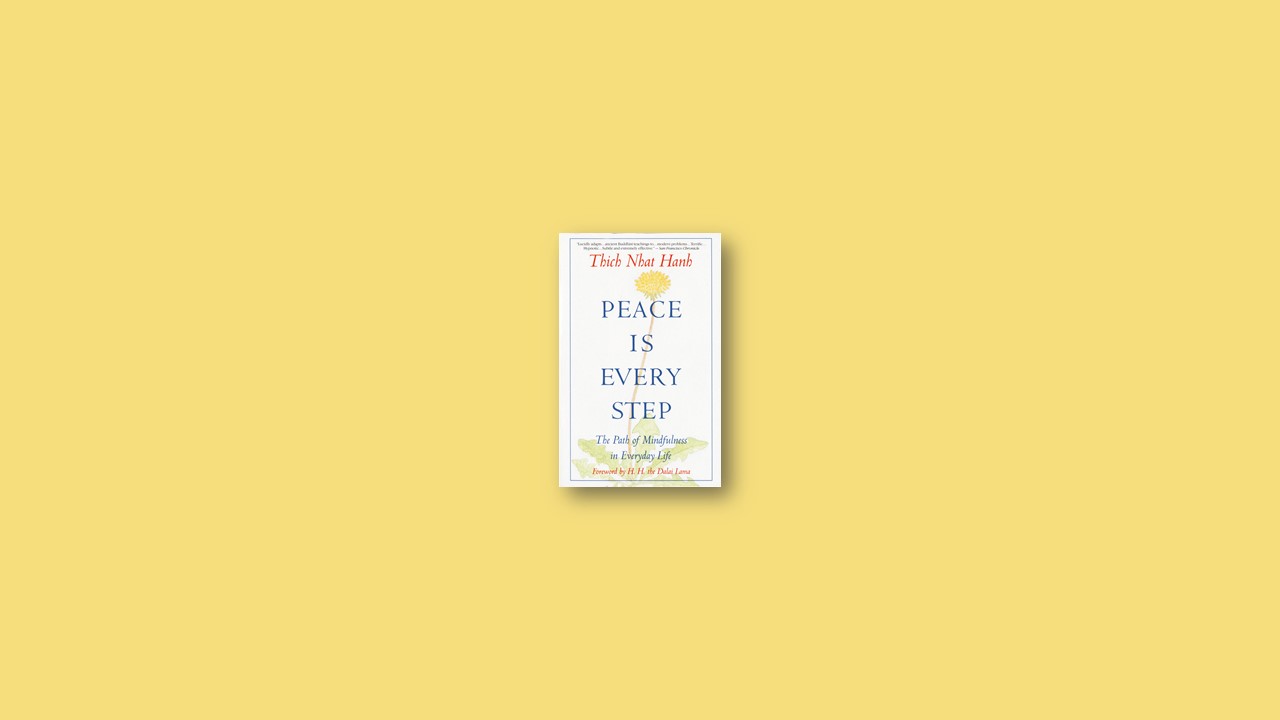Twenty-Four Brand-New Hours
Every morning, when we wake up, we have twenty-four brand-new hours to live. What a precious gift! We have the capacity to live in a way that these twenty-four hours will bring peace, joy, and happiness to ourselves and others.
Peace is present right here and now, in ourselves and in everything we do and see. The question is whether or not we are in touch with it. We don’t have to travel far away to enjoy the blue sky. We don’t have to leave our city or even our neighborhood to enjoy the eyes of a beautiful child. Even the air we breathe can be a source of joy.
This small book is offered as a bell of mindfulness, a reminder that happiness is possible only in the present moment. Of course, planning for the future is a part of life. But even planning can only take place in the present moment. This book is an invitation to come back to the present moment and find peace and joy.
Conscious Breathing
There are a number of breathing techniques you can use to make life vivid and more enjoyable. The first exercise is very simple. As you breathe in, you say to yourself, “Breathing in, I know that I am breathing in.” And as you breathe out, say, “Breathing out, I know that I am breathing out.” Just that. You recognize your in-breath as an in-breath and your out-breath as an out-breath. You don’t even need to recite the whole sentence; you can use just two words: “In” and “Out.” This technique can help you keep your mind on your breath. As you practice, your breath will become peaceful and gentle, and your mind and body will also become peaceful and gentle. This is not a difficult exercise. In just a few minutes you can realize the fruit of meditation.
Thinking Less
While we practice conscious breathing, our thinking will slow down, and we can give ourselves a real rest. Most of the time, we think too much, and mindful breathing helps us to be calm, relaxed, and peaceful. It helps us stop thinking so much and stop being possessed by sorrows of the past and worries about the future. It enables us to be in touch with life, which is wonderful in the present moment.
Of course, thinking is important, but quite a lot of our thinking is useless. It is as if, in our head, each of us has a cassette tape that is always running, day and night. We think of this and we think of that, and it is difficult to stop. With a cassette, we can just press the stop button. But with our thinking, we do not have any button. We may think and worry so much that we cannot sleep. If we go to the doctor for some sleeping pills or tranquilizers, these may make the situation worse, because we do not really rest during that kind of sleep, and if we continue using these drugs, we may become addicted. We continue to live tensely, and we may have nightmares.
Sitting Anywhere
You do not need to rush home to your meditation cushion or to a meditation center in order to practice conscious breathing. You can breathe anywhere, just sitting on your chair at the office or sitting in your automobile. Even if you are at a shopping center filled with people or waiting in line at a bank, if you begin to feel depleted and need to return to yourself, you can practice conscious breathing and smiling just standing there.
Wherever you are, you can breathe mindfully. We all need to go back to ourselves from time to time, in order to be able to confront the difficulties of life. We can do this in any position—standing, sitting, lying down, or walking. If you can sit down, however, the sitting position is the most stable.
Breathing Room
We have a room for everything—eating, sleeping, watching TV—but we have no room for mindfulness. I recommend that we set up a small room in our homes and call it a “breathing room,” where we can be alone and practice just breathing and smiling, at least in difficult moments. That little room should be regarded as an Embassy of the Kingdom of Peace. It should be respected, and not violated by anger, shouting, or things like that. When a child is about to be shouted at, she can take refuge in that room. Neither the father nor the mother can shout at her anymore. She is safe within the grounds of the Embassy. Parents sometimes will need to take refuge in that room, also, to sit down, breathe, smile, and restore themselves. Therefore, that room is for the benefit of the whole family.
Mindfulness of Anger
Anger is an unpleasant feeling. It is like a blazing flame that burns up our self-control and causes us to say and do things that we regret later. When someone is angry, we can see clearly that he or she is abiding in hell. Anger and hatred are the materials from which hell is made. A mind without anger is cool, fresh, and sane. The absence of anger is the basis of real happiness, the basis of love and compassion.
When our anger is placed under the lamp of mindfulness, it immediately begins to lose some of its destructive nature. We can say to ourselves, “Breathing in, I know that anger is in me. Breathing out, I know that I am my anger.” If we follow our breathing closely while we identify and mindfully observe our anger, it can no longer monopolize our consciousness.
Living Together
When we live with another person, to protect each other’s happiness, we should help one another transform the internal formations that we produce together. By practicing understanding and loving speech, we can help each other a great deal. Happiness is no longer an individual matter. If the other person is not happy, we will not be happy either.
To transform the other person’s knots will help bring about our own happiness as well. A wife can create internal formations in her husband, and a husband can do so in his wife, and if they continue to create knots in each other, one day there will be no happiness left.
The root cause of any internal formation is a lack of understanding. If we can see the misunderstanding that was present during the creation of a knot, we can easily untie it. To practice mindful observation is to look deeply to be able to see the nature and causes of something. One important benefit of this kind of insight is the untying of our knots.
Love in Action
Now, as we make our way through the wider world, some additional guidelines can help us and protect us. Several members of our community have been practicing the following principles, and I think you may also find them useful in making choices as to how to live in our contemporary world. We call them the fourteen precepts of the Order of Interbeing.
- Do not be idolatrous about or bound to any doctrine, theory, or ideology. All systems of thought are guiding means; they are not absolute truth.
- Do not think that the knowledge you presently possess is changeless, absolute truth. Avoid being narrow-minded and bound to present views. Learn and practice non-attachment from views in order to be open to receive others’ viewpoints. Truth is found in life and not merely in conceptual knowledge. Be ready to learn throughout your entire life and to observe reality in yourself and in the world at all times.
- Do not force others, including children, by any means whatsoever, to adopt your views, whether by authority, threat, money, propaganda, or even education. However, through compassionate dialogue, help others renounce fanaticism and narrowness.
- Do not avoid contact with suffering or close your eyes before suffering. Do not lose awareness of the existence of suffering in the life of the world. Find ways to be with those who are suffering, by all means, including personal contact and visits, images, and sound. By such means, awaken yourself and others to the reality of suffering in the world.
- Do not accumulate wealth while millions are hungry. Do not take as the aim of your life fame, profit, wealth, or sensual pleasure. Live simply and share time, energy, and material resources with those who are in need.
- Do not maintain anger or hatred. Learn to penetrate and transform them while they are still seeds in your consciousness. As soon as anger or hatred arises, turn your attention to your breathing in order to see and understand the nature of your anger or hatred and the nature of the persons who have caused your anger or hatred.
- Do not lose yourself in dispersion and in your surroundings. Practice mindful breathing in order to come back to what is happening in the present moment. Be in touch with what is wondrous, refreshing, and healing, both inside and around yourself. Plant the seeds of joy, peace, and understanding in yourself in order to facilitate the work of transformation in the depths of your consciousness.
- Do not utter words that can create discord and cause the community to break. Make every effort to reconcile and resolve all conflicts, however small.
- Do not say untruthful things for the sake of personal interest or to impress people. Do not utter words that cause division and hatred. Do not spread news that you do not know to be certain. Do not criticize or condemn things that you are not sure of. Always speak truthfully and constructively. Have the courage to speak out about situations of injustice, even when doing so may threaten your own safety.
- Do not use the religious community for personal gain or profit, or transform your community into a political party. A religious community should, however, take a clear stand against oppression and injustice, and should strive to change the situation without engaging in partisan conflicts.
- Do not live with a vocation that is harmful to humans and nature. Do not invest in companies that deprive others of their chance to live. Select a vocation that helps realize your ideal of compassion.
- Do not kill. Do not let others kill. Find whatever means possible to protect life and prevent war.
- Possess nothing that should belong to others. Respect the property of others but prevent others from enriching themselves from human suffering or the suffering of other beings.
- Do not mistreat your body. Learn to handle it with respect. Do not look on your body as only an instrument. Preserve vital energies for the realization of the Way. Sexual expression should not happen without love and commitment. In sexual relationships, be aware of future suffering that may be caused. To preserve the happiness of others, respect the rights and commitments of others. Be fully aware of the responsibility of bringing new lives into the world. Meditate on the world into which you are bringing new beings.


